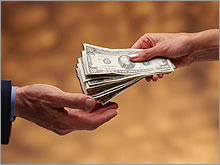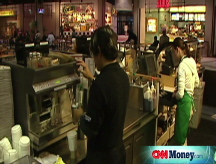Businesses brace for minimum wage hike
Business owners face a cost spike on Thursday, when minimum wage rises to $6.55 per hour.

(Fortune Small Business) -- With commodity, fuel and insurance costs hitting record highs, small-business owners are anxious about Thursday's federal minimum wage hike, which will require employers in 26 states and the District of Columbia to raise their base to at least $6.55.
The increase of the previous $5.85 per hour minimum wage is the second of three consecutive annual hikes mandated by a 2007 amendment to the Fair Labor Standards Act, known as the Fair Minimum Wage Act.
When legislators nationwide began a push two years ago for minimum-wage increases, Fortune Small Business found that many entrepreneurs considered the issue irrelevant. Amid a tight labor market, most owners were already paying higher-than-required wages to attract and retain workers, even entry-level ones.
Today's economic climate is very different. Prices for a wide range of business commodities, from gas to grain, are soaring. The Labor Department reported a net loss of 62,000 jobs in June, the sixth straight month of losses. The National Federation of Independent Business's (NFIB) latest installment of its monthly Small Business Economic Trends found that 18% of business owners polled cut staff in June.
Small-business owners such as Joy Kealey view the new mandatory increase as another frustrating pinch on profits.
Kealey owns a Boise pizza chain called Chicago Connection in Idaho, one of nine states with a minimum wage set at the federal level. Five states have no minimum wage and by default follow the federal standard, while three states have state minimums below the federal level, according to the Department of Labor. (For all but a handful of exempt positions, the federal minimum overrides the state law and becomes the de facto minimum.) The remaining 33 states have their own minimum wage rates, many higher than the new mandated minimum. In total, 26 states (plus Washington, D.C., which will raise its rate to $1 above the federal rate) will be affected by Thursday's change. (For a state-by-state breakdown, see our guide to state minimum wages.)
Of the 260 workers Kealey employs in her 11 restaurants, she estimates that 5% to 10% are paid minimum wage and will receive a raise this week. The increase may also force increases in her other staffers' salaries: Kealey is debating proportionally increasing the hourly rates of her other employees, to maintain the distinction between entry-level and higher pay grades.
Kealey's biggest concern is that the increase kicks in amid rising costs for many commodities essential to her business, especially cheese and flour. The cost of fueling and maintaining Chicago Connection's 60 delivery trucks is also soaring.
"It's very difficult to pass along price increases to consumers right now, because they're watching every penny they're spending, as well," Kealey said.
Instead, Kealey is relaying on cost-cutting strategies implemented over the last two years to help cushion the wage increase: specifically, a per-order delivery fee and increased local ingredient sourcing to diminish transport costs. She's also built a loyal customer base by sponsoring community organizations and events.
Still, she recognizes that her business, which made more than $5 million last year, may end 2008 a bit weaker.
"Business cycles exist," she said. "There are good years and not so good years."
Susan Eckerly, the NFIB's vice president for federal policy, hears Kealey's concerns echoed throughout the country.
"You can argue that around the time of the previous increase, it was hard to find a small business owner in the country who didn't pay that amount [already]," she said. "The tough part about the scheduled increase right now is the state of the economy. This is going to hit some small businesses hard, particularly those that hire seasonal summer labor."
In Texas, where the minimum wage rate will also rise to the new federal level of $6.55, James Wilhite plans to increase the hourly rates of all of his employees by 12%, whether or not they are paid minimum wage. Wilhite, whose landscaping business in Tyler does $2.5 million in annual sales, already finds it hard to afford fuel to power his fleet of trucks, mowers, weed eaters and leaf blowers.
"We're just simply going to have to pass the increase on to customers," Wilhite said.
Proponents of the increase say it will help strengthen the rocky economy. Jen Kern, director of the Association of Community Organizations for Reform Now's Living Wage Resource Center, believes the increase will boost sales for some businesses: "The best way to stimulate the economy is to put the money in the hands of people who will spend it in their neighborhoods, buying groceries or at the hardware store," she said.
Kern understands the frustrations of small business owners, but she is more sympathetic to low-wage earning workers who are also trying to stay afloat.
"I don't fault the anger or frustrations of a small-business employer dealing with all the rising costs," Kern said. "I just don't think the answer is keeping the minimum wage at a level that, in terms of real dollars, is below where it was 40 years ago. Yes, there are a lot of prices increasing, but these workers have to buy gas, too."
With costs rising, owners face hard choices about where to cut. At their two restaurants in Portland, Ore., Leslie Palmer and her husband Gary Kneski pay 10 of their 12 employees the minimum rate. Those staffers won't be getting a raise this week: Oregon has increased its minimum wage rate every year since 2002 and has the fourth-highest rate in the country, at $7.95 per hour.
"Because the minimum wage is so high here, I can't do things like offer health insurance to my employees," Palmer said. To help keep labor costs low, she hires only part-time employees and aggressively reduces staff during slower shifts and seasons.
The minimum wage is scheduled for its next 70-cent lift in July 2009, when it will hit $7.25. Chicago Connection's Kealey hopes that the economy will be stronger by then.
"Hopefully, by next year, consumers will be more confident about their personal wealth and be more prepared to accept price increases." ![]()
Minimum wages, state by state
Who's afraid of the minimum wage?
Defying the downturn: 5 strategies
Stimulus made no difference, small-biz owners say
Buy equipment now! 2008 tax breaks
-
The Cheesecake Factory created smaller portions to survive the downturn. Play
-
A breeder of award-winning marijuana seeds is following the money and heading to the U.S. More
-
Most small businesses die within five years, but Amish businesses have a survival rate north of 90%. More
-
The 10 most popular franchise brands over the past decade -- and their failure rates. More
-
These firms are the last left in America making iconic products now in their twilight. More














